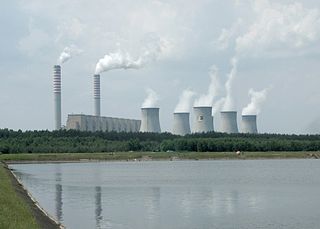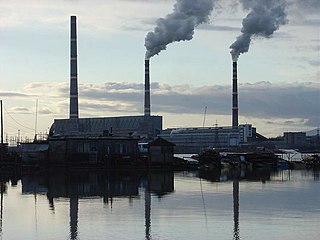Emissions trading is a liberal approach to controlling pollution by removing economic incentives for achieving reductions in the emissions of pollutants.
The Clear Skies Act of 2003 was a proposed federal law of the United States. The official title as introduced is "a bill to amend the Clean Air Act to reduce air pollution through expansion of cap-and-trade programs, to provide an alternative regulatory classification for units subject to the cap and trade program, and for other purposes."

A fossil fuel power station is a thermal power station which burns a fossil fuel, such as coal or natural gas, to produce electricity. Fossil fuel power stations have machinery to convert the heat energy of combustion into mechanical energy, which then operates an electrical generator. The prime mover may be a steam turbine, a gas turbine or, in small plants, a reciprocating gas engine. All plants use the energy extracted from expanding gas, either steam or combustion gases. Although different energy conversion methods exist, all thermal power station conversion methods have efficiency limited by the Carnot efficiency and therefore produce waste heat.

Coal pollution mitigation, often called clean coal, is a series of systems and technologies that seek to mitigate the pollution and other environmental effects normally associated with the burning of coal, which is widely regarded as the dirtiest of the common fuels for industrial processes and power generation.
A low-carbon economy (LCE), low-fossil-fuel economy (LFFE), or decarbonised economy is an economy based on low carbon power sources that therefore has a minimal output of greenhouse gas (GHG) emissions into the biosphere, but specifically refers to the greenhouse gas carbon dioxide. GHG emissions due to anthropogenic (human) activity are the dominant cause of observed global warming since the mid-20th century. Continued emission of greenhouse gases may cause long-lasting changes around the world, increasing the likelihood of severe, pervasive and irreversible impacts for people and ecosystems.
A carbon price — the method favored by many economists for reducing global warming emissions — is a cost applied to carbon pollution to encourage polluters to reduce the amount of greenhouse gases they emit into the atmosphere: it usually takes the form either of a carbon tax or a requirement to purchase permits to emit, generally known as carbon emissions trading, but also called "allowances".

According to the U.S. Energy Information Industry (EIA), the United States produced 5.14 billion metric tons of carbon-dioxide equivalent greenhouse gas (GHG) emissions in 2017, the lowest since the early 1990s. From year to year, emissions rise and fall due to changes in the economy, the price of fuel and other factors. The US Environmental Protection Agency attributed recent decreases to a reduction in emissions from fossil fuel combustion, which was a result of multiple factors including switching from coal to natural gas consumption in the electric power sector; warmer winter conditions that reduced demand for heating fuel in the residential and commercial sectors; and a slight decrease in electricity demand.

Fossil fuel phase out means using less fossil fuels and eventually none at all. This is done mainly by stopping building new fossil-fuel power stations; closing down existing ones; and using alternative energy to replace fossil fuels in sectors such as transport, heating and industry.

Mitigation of global warming involves taking actions to reduce greenhouse gas emissions and to enhance sinks aimed at reducing the extent of global warming. This is in distinction to adaptation to global warming, which involves taking action to minimize the effects of global warming. Scientific consensus on global warming, together with the precautionary principle and the fear of non-linear climate transitions, is leading to increased effort to develop new technologies and sciences and carefully manage others in an attempt to mitigate global warming.

The American Clean Energy and Security Act of 2009 (ACES) was an energy bill in the 111th United States Congress that would have established a variant of an emissions trading plan similar to the European Union Emission Trading Scheme. The bill was approved by the House of Representatives on June 26, 2009 by a vote of 219-212, but was never brought to the floor of the Senate for discussion or a vote.
Global climate change was first addressed in United States policy beginning in the early 1950s. The Environmental Protection Agency (EPA) defines climate change as "any significant change in the measures of climate lasting for an extended period of time." Essentially, climate change includes major changes in temperature, precipitation, or wind patterns, as well as other effects, that occur over several decades or longer. Climate change policy in the U.S. has transformed rapidly over the past twenty years and is being developed at both the state and federal level. The politics of global warming and climate change have polarized certain political parties and other organizations. This article focuses on climate change policy within the United States, as well as exploring the positions of various parties and the influences on policy making and environmental justice repercussions.

Fee and dividend or carbon fee and dividend (CF&D) is a market-based mechanism for reducing the carbon emissions that help to drive anthropogenic climate change. Carbon fee and dividend begins with levying a progressively rising fee on carbon-based fuels when they are extracted, then returning some or all of the revenue to the public as a regular energy dividend. This is intended to incentivize a shift to low-carbon energy while protecting consumers from any increases in the costs of carbon-based fuels.

Individual action on climate change can include personal choices in many areas, including consumption of goods and services, including household energy use; long and short-distance travel mechanisms; food and diet choices; and family size. Individuals can also engage in local and political advocacy around issues of climate change.

Climate change has worsened at the hands of human activity for centuries, and many scientific efforts have been made since the first political acknowledgment. In order to avoid the ongoing and potential impacts of climate change, mitigation technologies have been developed in order to adapt to the issue, each invention belonging to one of four specific groups of effort. These groups include energy efficiency improvements, renewable energy (RE), nuclear power/energy (NE), and carbon capture storage (CCS). However, concerns regarding mitigating and adapting to climate change commonly have a priority focus on the groups of carbon capture storage and renewable energy efforts.

Green economy policies in Canada are policies that contribute to transitioning the Canadian economy to a more environmentally sustainable one. The green economy can be defined as an economy, "that results in improved human well-being and social equity, while significantly reducing environmental risks and ecological scarcities." Aspects of a green economy would include stable growth in income and employment that is driven by private and public investment into policies and actions that reduce carbon emissions, pollution and prevent the loss of biodiversity.

The Washington Carbon Emissions Fee and Revenue Allocation Initiative, also known as Initiative 1631 or the Protect Washington Act was a ballot measure that appeared on ballots in the State of Washington in the November 2018 election. The initiative proposed to reduce pollution by levying a fee on greenhouse gas emissions generated within the state of Washington, and using that revenue to support air quality and energy projects, as well as water quality and forest health initiatives. The measure failed with 56.3% of voters rejecting it.


















